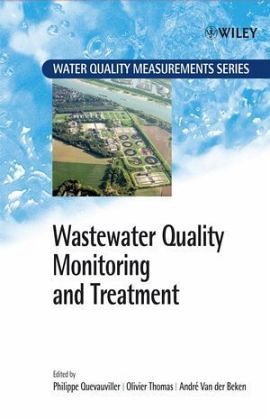
Wastewater Quality Monitoring and Treatment

PAYBACK Punkte
113 °P sammeln!
Wastewater monitoring procedures are subject to many drawbacks due to the difficulties in accurately and frequently measuring the necessary variables, which essentially rely on 'classical' monitoring approaches involving sampling, storage and laboratory analysis. The only way to make progress in wastewater treatment, and hence to comply with related regulations, is to ensure that the plants are able to work with complete reliability. This implies that reliable monitoring of the wastewater quality and quantity and of the treatment efficiency should be performed for the characterisation of raw a...
Wastewater monitoring procedures are subject to many drawbacks due to the difficulties in accurately and frequently measuring the necessary variables, which essentially rely on 'classical' monitoring approaches involving sampling, storage and laboratory analysis. The only way to make progress in wastewater treatment, and hence to comply with related regulations, is to ensure that the plants are able to work with complete reliability. This implies that reliable monitoring of the wastewater quality and quantity and of the treatment efficiency should be performed for the characterisation of raw and treated wastewaters and for the control of the plant itself.
This book reflects this awareness by summarising different views on wastewater treatment-related monitoring and control. It is composed of six different parts as follows:
_ The first part provides an overview of EU and US wastewater policies, standard methodologies, reference materials and discusses sampling assistance, biosensors and alternative methods.
_ Sewer quality control is examined in the second part, including considerations on sewage characterisation and evolution, flow measurements and monitoring in rural areas.
_ This is followed in the third and fourth parts, by chapters concerning urban wastewater treatment plant control and industrial wastewater treatment plant control.
_ Part Five discusses monitoring in the context of discharges and receiving medium, including water quality modelling.
_ Finally, socio-economic aspects are considered in the sixth part with a focus on data collection and merging, as well as training.
This book has been written by experts in the field of wastewater treatment policy, control and monitoring. It provides an overview of the existing knowledge in wastewater monitoring and identifies emerging needs, which will be of direct interest to policy makers, water scientist and industry, and analytical control laboratories.
Water Quality Measurement Series
This series provides a comprehensive coverage of the analytical techniques used for the measurement of substances in water, from sampling through to laboratory analysis. The scope of the series encompasses topic issues including quality assurance, standard procedures, and the best practices in measuring water quality, from surface and drinking water to coastal and wastewater. The techniques will be discussed in relation to current legislation and guidelines.
The series aims to offer workable answers to specific practical issues related to measurements of the water cycle quality, using a comprehensive and scientifically sound approach.
This book reflects this awareness by summarising different views on wastewater treatment-related monitoring and control. It is composed of six different parts as follows:
_ The first part provides an overview of EU and US wastewater policies, standard methodologies, reference materials and discusses sampling assistance, biosensors and alternative methods.
_ Sewer quality control is examined in the second part, including considerations on sewage characterisation and evolution, flow measurements and monitoring in rural areas.
_ This is followed in the third and fourth parts, by chapters concerning urban wastewater treatment plant control and industrial wastewater treatment plant control.
_ Part Five discusses monitoring in the context of discharges and receiving medium, including water quality modelling.
_ Finally, socio-economic aspects are considered in the sixth part with a focus on data collection and merging, as well as training.
This book has been written by experts in the field of wastewater treatment policy, control and monitoring. It provides an overview of the existing knowledge in wastewater monitoring and identifies emerging needs, which will be of direct interest to policy makers, water scientist and industry, and analytical control laboratories.
Water Quality Measurement Series
This series provides a comprehensive coverage of the analytical techniques used for the measurement of substances in water, from sampling through to laboratory analysis. The scope of the series encompasses topic issues including quality assurance, standard procedures, and the best practices in measuring water quality, from surface and drinking water to coastal and wastewater. The techniques will be discussed in relation to current legislation and guidelines.
The series aims to offer workable answers to specific practical issues related to measurements of the water cycle quality, using a comprehensive and scientifically sound approach.


